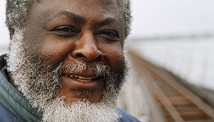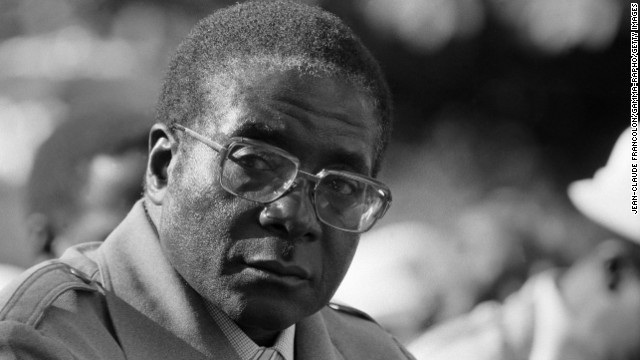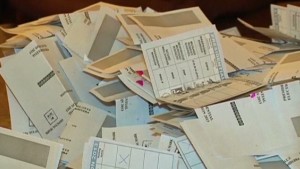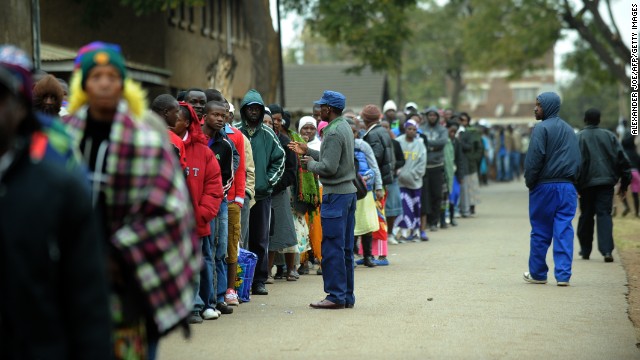 (CNN) -- In the absence of a proper voters' roll and
credible international observers, no one can honestly say with any
degree of certainty whether last week's elections reflected the will of
the Zimbabwean people. One thing is certain -- the numbers simply do not
add up.
(CNN) -- In the absence of a proper voters' roll and
credible international observers, no one can honestly say with any
degree of certainty whether last week's elections reflected the will of
the Zimbabwean people. One thing is certain -- the numbers simply do not
add up.
And isn't it strange that
there have been no jubilant celebrations by the "winners?" It's as
though the Zanu-PF and Robert Mugabe, elected to yet another term as
Zimbabwe's president, can't quite believe it themselves. The general
mood across the nation is one of despondency. Everyone seems depressed.
No one knows what to do next. It would seem the will of the people has
not triumphed at all. Riot police patrol quiet streets. No one sings or
dances.
 Photos: Robert Mugabe through the years
Photos: Robert Mugabe through the years
 Was Zimbabwe's vote free and fair?
Was Zimbabwe's vote free and fair?
 Zimbabwe's economy steadily growing
Zimbabwe's economy steadily growing
 Photos: Zimbabwe votes
Photos: Zimbabwe votes
Wilf Mbanga
What happened on July 31
was a demonstration of what can be done by a small group of people who
have everything to lose and who have spent more than 30 years cementing
their grip on power and wealth. It certainly was not a popularity
contest.
Mercifully it was
peaceful. Memories of the 2008 election -- burnt and lacerated bodies,
weeping girls and women who had been raped, swollen, bleeding feet and
dead bodies -- were fresh in the minds of many.
LATEST: Western nations question Zimbabwe poll results
The Zanu-PF's "victory" must be considered in the light of the following: This is a country where 95% of the population is unemployed;
an estimated 25% live and work in the diaspora to keep their relatives
back home fed and at school; 15% are orphans (largely as a result of the
AIDS pandemic). It is therefore pretty easy to buy people -- and votes.
 Photos: Robert Mugabe through the years
Photos: Robert Mugabe through the years
 Was Zimbabwe's vote free and fair?
Was Zimbabwe's vote free and fair?
 Zimbabwe's economy steadily growing
Zimbabwe's economy steadily growing
 Photos: Zimbabwe votes
Photos: Zimbabwe votes
All those in the top
echelons of the army, the police, the judiciary and the body responsible
for elections are hand-picked, self-avowed Zanu-PF loyalists --
rewarded over the years via a well-orchestrated patronage system with
land, farming implements, luxury vehicles, plasma TVs, diamonds and
business opportunities.
Robert Mugabe is a very
wily politician. After losing the election in 2008, he and his generals
threw everything into this election -- determined to win at all costs.
They left nothing to chance. They also enlisted the help of the
controversial Israeli company Nikuv, which has been accused of
manipulating the vote in Zambia during the last election.
The Registrar General's
office was used to disenfranchise young people mainly in the urban
areas, and to overstate the number of old people in rural areas over 80.
According to their own figures, the RG registered just 8% of those in
the 18-19 age group -- and 220% of those in the over-80 age group,
according to analysis by the The Research and Advocacy Unit,
an NGO based in Harare. Younger people tend to vote for the MDC, led by
Morgan Tsvangirai, Mugabe's main rival, and older people for the
long-time president's Zanu-PF party.
The office also disenfranchised millions of people in the diaspora,
despite having signed up to the Southern African Development Community
election guidelines, which stipulate that provisions should be made for
those in the diaspora to vote.
MORE: The life and times of Robert Mugabe
A chaotic registration
process registered just 1.8 million voters in the urban areas that are a
stronghold for Tsvangirai's MDC, many of whom spent days queuing up to
vote. Hundreds of thousands were disenfranchised -- either their names
had been removed completely from voter rolls, or they appeared in a
different ward or even a different constituency. The voter's roll was
only made available to parties other than Zanu-PF on the eve of the
election after a High Court injunction had been granted, which meant
that other parties did not have the time to raise the alarm about the
myriad irregularities. Neither could people check that their names were
on the list, and in the right place. This caused enormous confusion on
the day and many would-be voters simply gave up.
The opposition MDC party
and civil observers have documented thousands of examples of impossible
numbers related to the election. In the rural area of Uzumba, for
instance, 21,000 people allegedly voted in 12 hours at 15 polling
stations -- that's one voter every two seconds. No village in Zimbabwe
has that many adults, and the process of finding one's name on the list,
dipping a finger in the special ink and placing one's X next to a
candidate would clearly take longer than 120 seconds.
There was documented evidence of Zanu-PF bussing rural people into urban areas to vote.
Although their names did not appear on the roll, they had voting slips
produced by the registrar's office which allowed them to cast their
votes. It is believed that this is what led to the MDC losing most of
its urban seats.
Zanu-PF covertly
continued to enroll more voters right up until the eve of the poll,
after the Zimbabwe Electoral Commission refused to extend the
registration days. The African Union and SADC observers brushed this off
as inconsequential.
Matabeleland province
consistently voted for Tsvangirai in the past, yet in this election
Mugabe made almost a clean sweep. These are people who hate Zanu-PF --
people who have bitter memories of the Gukurahundi genocide allegedly
perpetrated by Mugabe's men in the early 1980s. It is inconceivable that
they would vote en masse for Zanu-PF.
Intimidation also played
a huge role in the contest. In the weeks leading up to the election,
and even as early as January when Mugabe first started agitating for
elections to take place, The Zimbabwean and other independent media were
inundated with reports from all over the country of threats by
Zanu-PF's traditional leaders, youth militia, army and police officers
of a repeat of the 2008 violence if the party and Mugabe did not win.
There is, of course,
some support for Mugabe in the rural areas, where he has given hundreds
of thousands of families land, agricultural inputs and food -- which was
given as humanitarian aid by the international community and re-bagged
and distributed in Mugabe's name strictly to Zanu-PF members during the
past 15 years. Many families were threatened with the loss of their land
and homes if Zanu-PF did not win in their area.
Police officers and their families were warned that they would lose their homes
if Mugabe did not win the election. Add to this the tight control by
Zanu-PF of the mass media the constant demonization of Morgan
Tsvangirai, his MDC party and Western sanctions, and the exhaustion of a
populace ground down by decades of poverty, lack of access to
independent information, violence and the threat of violence -- and you
begin to understand the toxic recipe for a Zanu-PF "success" at the
polls.
The MDC also failed
Zimbabweans on several counts during the five years since they won the
election but were forced by the SADC into a power-"sharing" coalition
with Zanu-PF. These failures included Tsvangirai's indiscretions after
his wife died, corruption in urban councils controlled by the party,
failure to bring meaningful legislative change through parliament and
greed on the part of some MPs who sided with Zanu-PF in pursuit of more
pay and perks.
I doubt there will be
any serious violence now. People are shell-shocked and Mugabe's loyal
forces are well prepared with Chinese weapons and Israeli water cannons.
Riot squads are out in full force.
Tsvingirai's options are
limited. He seems inclined to appeal to the Constitutional Court for a
nullification and a re-run. But it is highly unlikely that judgement
would go in his favour given the compromised nature of the judiciary.
Just a few weeks before the election, Mugabe packed the courts with
hand-picked loyalists.
The MDC could appeal to
the SADC to nullify the result. But this is also unlikely to succeed
given that the SADC and the AU have already endorsed the results.
Passive resistance in a
country where 95% of people are unemployed is a non-starter. Any other
resistance would be met with greater force and give Mugabe the chance he
is waiting for -- to lock up all MDC leaders.

No comments:
Post a Comment